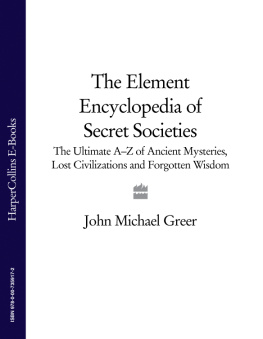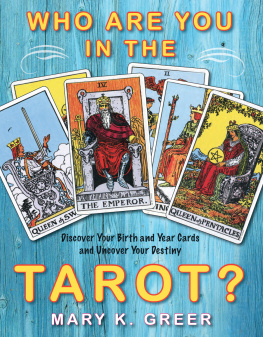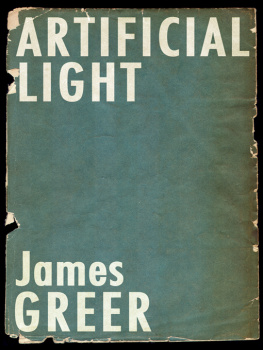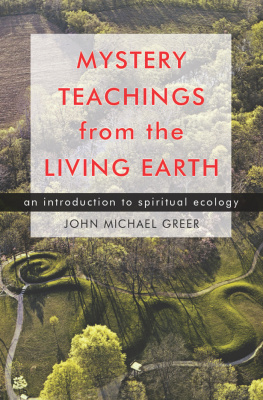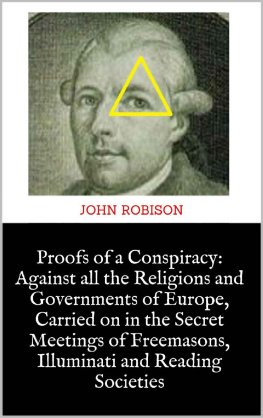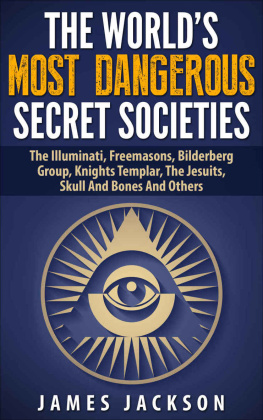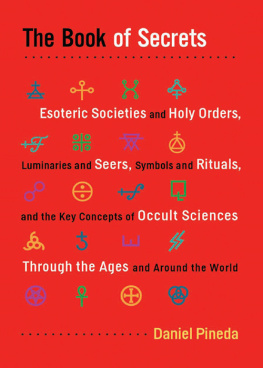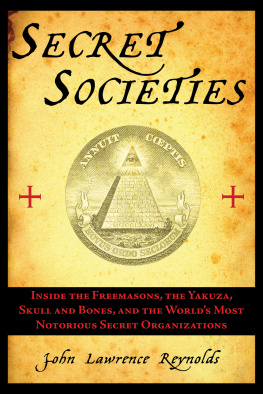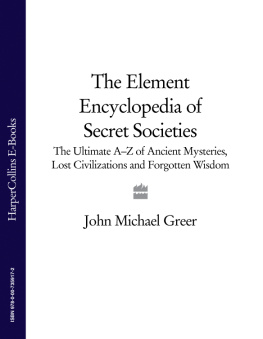On a spring afternoon some years ago, as I waited in the anteroom of an aging lodge building for my initiation into one of the higher degrees of a certain secret society, an elderly man in the full ceremonial uniform of that degree came in and looked at me for a long moment. You know, John, he said finally, you must be the first man ever initiated into this degree who wears his hair in a ponytail.
Yes, I said, and wed better hope Im not the last, either.
He nodded after a moment and went past me into the lodge room, and the ceremony began a few minutes later. The old mans name was Alvin Gronvold; during the few years I knew him before his death, he was a friend and mentor as well as a lodge brother. To him, and to all the men and women of his generation who kept the secret societies of the western world alive when they were ignored, ridiculed, or condemned by almost everyone else, this book is dedicated.
Behind the ordinary history of the world, the facts and dates that most of us learn in school and forget immediately thereafter, lies a second, hidden history of secret societies, lost civilizations, sinister conspiracies and mysterious events. This shadow side of history has become a pervasive theme in the popular culture of recent years. In an age of politicians who manipulate facts for their own benefit, scientists who invent data to advance their careers, and scholars who let their prejudices all too obviously shape their judgment, only the foolish or those with agendas of their own accept the claims of authority blindly.
Like the Holy Grail of legend, though, the truth behind commonly accepted realities is easier to seek than to find. Since the 1960s, when alternative visions first broke through into the cultural mainstream of the western world, the hidden history of the world has become the storm center of a flurry of uncertainties. What were the real origins of Christianity, the Freemasons, or the French Revolution? Do secret societies actually control the world, and if so, what do they plan to do with it? Does the hidden hand behind history belong to a cartel of bankers, a Gnostic secret society, the Catholic Church, the benevolent masters of the Great White Lodge, alien reptiles from another dimension, or Satan himself? Look at any five books or documentaries on the subject, and you can count on at least six mutually contradictory answers.
Fortunately, there are pathways through the fog. No secret society is completely secret, and even the murkiest events of hidden history leave traces behind. Theories about the shadow side of history have a history of their own. Current ideas about the Bavarian Illuminati or the lost continent of Atlantis, to name only two examples, mean one thing in the hothouse environment of the modern alternative-realities scene, and quite another in context, as ideas that have developed over time and absorbed themes and imagery from many sources. Errors of fact and disinformation can often be traced to their origins, and useful information unearthed from unexpected sources. All this can be done, but so far, too little of it has been done.
The Element Encyclopedia of Secret Societies is an alphabetic guide to this shadow side of history, and it attempts to sort out fact from the fictions, falsifications, and fantasies that have too often surrounded the subject. True believers and diehard skeptics alike may find themselves in unfamiliar territory, for I have not limited myself to the usual sources quoted and challenged in the alternative reality field; the material in this book has been gathered through many years of personal research, using scholarly works as well as more unorthodox sources of information. A bibliography at the end, and the suggestions for further reading following many of the articles, will allow readers who are interested in checking facts to do so.
Another resource I have used, one that will inevitably raise the hackles of some readers, stems from my personal involvement in secret societies and the occult underground of the modern world. I am a 32 Freemason, a Master of the Temple in one branch of the Golden Dawn tradition and an Adeptus Minor in another, the Grand Archdruid of one modern Druid order and a member of three others, and an initiate of more than a dozen other secret societies and esoteric traditions. The world of hidden history has been a central part of my life for more than 30 years. I make no apologies for this fact, and indeed some of the material covered in this book would have been much more difficult to obtain without the access, connections, and friendships that my participation in secret societies has brought me.
Many people have helped me gather information for this volume or provided other assistance invaluable in its creation. Some of them cannot be named here; they know who they are. Among those who can be named are Erik Arneson, Dolores Ashcroft-Nowicki, Philip Carr-Gomm, Peter Cawley, Patrick Claflin, Gordon Cooper, Lon Milo DuQuette, John Gilbert, Carl Hood Jr., Corby Ingold, Earl King Jr., Jay Kinney, Jeff Richardson, Carroll Poke Runyon, Todd Spencer, Mark Stavish, Donna Taylor, Terry Taylor, and my wife Sara. My thanks go with all.
Note: Readers will notice the occasional use of a triangle of dots instead of an ordinary period. This is because I have followed the Masonic punctuation practice when abbreviating Masonic terms.
ACCEPTED MASON
A member of a lodge of Masons who is not an operative Mason that is, a working stonemason but has joined the lodge to take part in its social and initiatory activities. The first accepted Masons documented in lodge records were Anthony Alexander, Lord William Alexander, and Sir Alexander Strachan of Thornton, who became members of the Edinburgh lodge in 1634. Sir Robert Moray, a Hermeticist and founding member of the Royal Society, became a member of the same lodge in 1640; the alchemist and astrologer Elias Ashmole was another early accepted Mason, joining a lodge in England in 1646. They and the thousands who followed them over the next century played a crucial role in the transformation of Freemasonry from a late medieval trade union to the prototypical secret society of modern times. See Ashmole, Elias; Freemasonry; Moray, Robert.
Further reading: Stevenson 1988.
ADONIS, MYSTERIES OF
A system of initiatory rites originally practiced in the Phoenician city of Byblos, in Lebanon, to celebrate the life, death, and resurrection of the old Babylonian vegetation god Tammuz, lover of Ishtar and subject of a quarrel between her and her underworld sister Ereshkigal. Local custom used the Semitic title Adonai, lord, for the god; after Alexander the Greats conquests brought Lebanon into the ambit of Greek culture, the gods name changed to Adonis, while Aphrodite and Persephone took the places of the older goddesses. In this Hellenized form the mystery cult of Adonis spread through much of the Middle East.
According to Greek and Roman mythographers, Adonis was the son of an incestuous affair between Cinyras, king of Cyprus, and his daughter Myrrha. He was so beautiful that the love goddess Aphrodite fell in love with him, but while hunting on Mount Lebanon he was gored to death by a wild boar. When he descended to Hades, Persephone, the queen of the underworld, fell in love with him as well and refused to yield to Aphrodites pleas that he be allowed to return to life. Finally the quarrel went before Zeus, king of the gods, who ruled that Adonis should live six months of the year in the underworld with Persephone and six months above ground with the goddess of love.
Brief references to the mystery rites suggest that initiates carried out a symbolic search for the lost Adonis, mourned his death, and then celebrated joyously when he returned to life. All this follows the standard pattern of Middle Eastern vegetation myth, with the deity of the crops buried with the seed and reborn with the green shoot, only to be cut down again by a sickle the shape of a boars tusk. The same pattern occurs in the Egyptian legend of Osiris, the myths behind the Eleusinian Mysteries of ancient Greece, and arguably in the Gospel accounts of the life and death of Jesus of Nazareth as well. See

